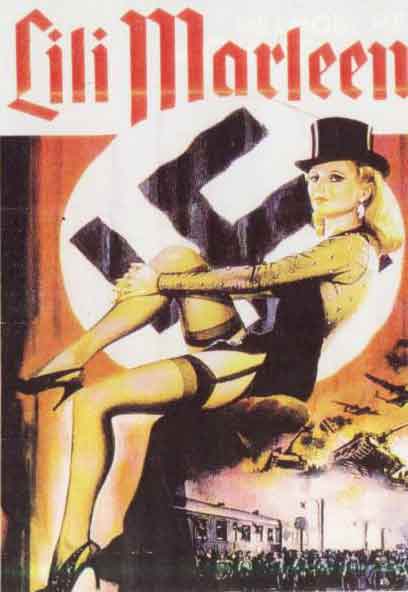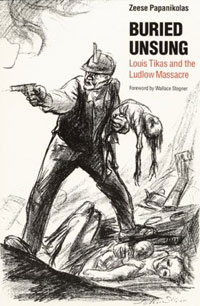 On the subject of historical misconceptions, you might say I’m hugely sentimental. So the tale of Lili Marlene catches me up like a honey trap. What does the name conjure for you? A Nazi Mata Hari? A fictional musical persona beloved by soldiers on both sides of the Good War? While even antiwar sentiments wax nostalgic about its universal love-conquers-all popularity, the WWII melody evokes romantic memories fueled by dueling propagandas. And when a victorious meme writes the history, it can erase its footprints, leading from what was effectively a literary rape.
On the subject of historical misconceptions, you might say I’m hugely sentimental. So the tale of Lili Marlene catches me up like a honey trap. What does the name conjure for you? A Nazi Mata Hari? A fictional musical persona beloved by soldiers on both sides of the Good War? While even antiwar sentiments wax nostalgic about its universal love-conquers-all popularity, the WWII melody evokes romantic memories fueled by dueling propagandas. And when a victorious meme writes the history, it can erase its footprints, leading from what was effectively a literary rape.
A recent folk reference for example, an otherwise impeccably adroit Lili Marlene Walks Away, about Marlene the streetwalker, leaves me just sick in the heart.
The historical narrative has it that Lili Marlene was actually Lili and Marleen, two girlfriends for whom German soldier Hans Liep pined from the trenches of WWI. With unchivalrous poetic license Liep conflated the two and penned a love poem as it might have been written to him, “signed, Lili Marleen.” Two decades later a German composer set the words to music and then came the outbreak of the next war. The original recording by Lale Anderson was a flop until broadcasts to the front lines over Radio Belgrade captivated homesick Wehrmacht soldiers and eventually the lovelorn battling on both sides. Lili Marlene emerged the most popular song of all time, translated in as many languages as fought in the war. Was this owed to a universal empathy toward the pangs of love, or was it the appeal of a truly catchy melody and lyrics carefully crafted to suit the moment? And how did Lili’s character become redefined?
For the German audience, the character of Lili Marlene did not change. For some the song lost its sheen for having been co-opted by the Third Reich war machine. But even as the singer’s living embodiment of “Lili Marleen” became tarnished by her Faustian-won fame, the title role of “Lili” remained the non-fictional love interest with whom her soldier lover spent every furtive off-duty moment, revisited in memory and in anticipation. Concurrent translations across the European continent stuck to the same essential theme, owing no doubt to listeners being in the main multilingual. They understood enough of the original German not to be sold another Lili Marlene. English was another story, but the Allies didn’t start it.
Nazi propaganda minister Joseph Goebbels at first banned the song because he saw it as demoralizing to soldiers enduring the deprivations of war. He referred to Lili Marlene as “The tearjerker with the death-dance smell” until its popularity reached a critical mass even he couldn’t stop. When opposing forces seemed also to succumb to the song’s wiles, Goebbels sought to intensify the poison’s venom.
The original German lyric was written in an ambiguous voice, either that of the soldier or his faithful girl, revisiting their every last moment together and the promise of more. Even as the imagery may have been accepted as a soldier’s fantasies, the singer’s female gender was consistent with the voice of his lover’s reassurances. As a result, the original singer came to personify the character Lili Marleen. For soldiers of every side the voice they heard was that of “Lili Marlene.”
The popular account goes that when Allied soldiers were observed singing along to Radio Belgrade, an English lyric was ordered post haste lest American GIs and British Tommies be singing in German. Rarely mentioned is that the seduction interrupted had been in English.
A recent compilation of nearly 200 different renditions of Lili Marlene gives an unprecedented look into the WWII propaganda battle waged over control of the Lili Marlene narrative. Many of the key recordings have reached Youtube.
When the Germans surmised that Allied soldiers wanted to do more than whistle along, a lyric was devised for them which changed the ambiguity of the narrator to the first person. YOUR Lili Marleen became MY Lili Marlene. And oddly, but for reasons un-mysterious obviously, the vocalist remained a woman. The English version was supposed to be a translation after all, and no one was under any illusion that the song’s original appeal with soldiers was not owed to the enchantment of the chanteuse.
The plodding, dripping sentimentality of the melody also lent well to marches. Lili Marleen, in English, Marlene, was an ideal tonic for a war long on effort and deprivation.
An American GI today could still be forgiven for hearing Lili Marlene and saying: those aren’t the lyrics I remember. Late and post war USO tours effaced the earlier Nazi radio broadcasts. There was a German English version before the British and American after that, when Lili of the home front became the seductress became the whore.
If the song conjures an American image at all, it’s Marlene Dietrich, who subsequently claimed the song for her own, perhaps why it’s named Marlene and not Marleen, I don’t know. But her vampy rendition colors interpretations to this day. An American film star from the 30s, Dietrich is still mistakenly remembered as a reformed German double agent, possibly the Axis Sally propagandist who originated her namesake song.  To my mind, familiarity would be the only reason to favor Dietrich’s rendition of Lili Marlene. The original 1938 German and its first English incarnation in 1942 were both by Lale Andersen, easily the most moving. But Marlene Dietrich wasn’t selling love, or was, to be more precise.
To my mind, familiarity would be the only reason to favor Dietrich’s rendition of Lili Marlene. The original 1938 German and its first English incarnation in 1942 were both by Lale Andersen, easily the most moving. But Marlene Dietrich wasn’t selling love, or was, to be more precise.
The lyric to the original German recording translates thus:
In front of the barracks, in front of the main gate,
Stood a lamppost, if it stands there still,
So will we see each other there again,
By the lamppost we’ll stand,
As before, Lili Marleen. As before, Lili Marleen.
Our two shadows looked like one.
That we were so much in love, at a glance anyone could see.
And everyone will see it,
When we stand by the lamppost,
As before, Lili Marleen. As before, Lili Marleen.
(The motif of female narrator was conceded by a 1943 BBC propaganda rerecording made for broadcast back to Germany. Instead of a love song, the lyric became a war-weary rant where a hoarse-throated middle-aged “Lili” calls for an uprising against Hitler. Loosely translated it went:
Maybe you’ll die in Russia, maybe you’ll die in Africa,
You will die somewhere, that’s what your Führer wants.
But if you see us again, where will this lamppost be?
In another Germany.
Your Lili Marleen.
The Führer is a oppressor, that’s what we all see,
Making every child an orphan, every woman a widow,
It’s all his fault, I want to see? him at the lamppost,
Hang him up at the lamppost.
Your Lili Marleen.
)
The German propagandists were more insidious with their subversion of Andersen’s 1942 recording, sticking closely to the original setting, shifting the narrator squarely to the male, relegating Lili not just to the third person but to the past, and interjecting heaping doses of sentimentality:
Underneath the lantern, by the barrack gate,
There I met Marleen every night at eight.
That was a time in early Spring,
When birds all sing, then love was king
Of my heart and Marleen’s, of my heart and Marleen’s.
The next verse begins with a cringe-worthy overstep of a military put-down, perhaps however to divert critical faculties from the real manipulation. Even though the song is now in English, the soldiers expect it serves German propaganda. Disarmed by the amateurish mocking of “retreat,” the listener is vulnerable as the rest of the lyric preys on a soldier’s insecurity about his sweetheart’s fidelity, the longer the war years become interminable. The subject is the usual propaganda leaflet fare, but animated with the potency of music. Faithful “as before” became “time would part” Marlene.
Waiting for the drumbeat, signaling retreat,
Walking in the shadows, where all lovers meet.
Yes those were days of long ago,
I loved her so, I couldn’t know
That time would part Marleen, that time would part Marleen.
The pace leadens to deliver the fatal pronouncement, again the anticipation of reunion becomes perseveration and lament:
When I heard the bugle, calling me away,
By the gate I kissed her, kissed her tears away.
And by the flick’ring lantern’s light,
I held her tight, t’was our last night,
My last night with Marleen, my last night with Marleen.
The last verse repeats the first, which I omitted earlier. It’s a call to action, obviously absent the original, “Now is the time-” meaning desertion into the aforementioned shadows, “to meet your-” and I must admit to be unsure of a transcription. From Andersen’s accent to the unclear recording quality of her backup chorus, it’s difficult to determine whom Lili wants the soldier to meet. “Your girl” and two other words which rhyme with girl, the first begins with P, the last with S.
Still I hear the bugle, hear its silv’ry call,
Carried by the night air, telling one and all:
Now is the time to meet your pearl,
To meet your girl, to meet your soul,
As once I met Marleen, my sweet Lili Marleen.
Your girl, not Lili Marleen. She’s gone, a love lost to regret. In their German-accented affected English, the male chorus appeared to provide a mocking echo “Now is the time to meet your death.”
Needless to say it was imperative that while Radio Belgrade reached the English and American soldiers in North Africa and Italy, the Allies had to record an antidote. A first version by a Brit kept with the romantic original:
In the dark of evening, where you stand and wait,
Hangs a lantern gleaming by the barrack gate.
We’ll meet again by lantern shine
As we did once upon a time.
We two Lili Marlene, we two Lili Marlene.
Our shadows once stood facing, a tall one and a small.
They mingled in embracing, upon the lighted wall.
And passers by could see and tell
Who kissed my shadow there so well:
My girl Lili Marlene, my girl Lili Marlene.
But that didn’t address the problem of demoralization, Goebbels’ original concern shared by military commanders no matter which side: soldiers overtaken by depression.
Plus the Allies needed less a song about the girl back home than one about the German lass awaiting the Yankee conqueror. Who are we kidding? Lili Marlene’s German voice did not invoke thoughts of home so much as a foreign woman taunting, however innocent, from behind enemy lines. Eventually those lands would be overrun, her lover to die in their defense, Lili to await the last man standing. How many soldiers listened to Radio Belgrade and did not fantasize about cuckolding their adversary with his beloved Lili Marlene?  The Allied troops needed a Lili of not-unfaithful character, but one available to them. It was no big leap for an American lyricist to transform Fritz’s Lili, faithfully waiting for him under the lamppost, to “Lili of the Lamplight,” the only type of German woman with whom American GIs would be able to get near, a prostitute.
The Allied troops needed a Lili of not-unfaithful character, but one available to them. It was no big leap for an American lyricist to transform Fritz’s Lili, faithfully waiting for him under the lamppost, to “Lili of the Lamplight,” the only type of German woman with whom American GIs would be able to get near, a prostitute.
Underneath the lantern by the barrack gate,
Darling I remember the way you used to wait.
Twas there that you whispered tenderly
That you loved me, you’d always be
My Lili of the lamplight, my own Lili Marlene.
You’ll always be mine? My love? No, my lover by the lamplight. In the new scheme, the mentions of love and tears become sublimated by kisses, caresses, whispers of tender nothings and feet waiting in the street. Sung to the Allied troops as they marched unto Berlin by a husky voiced vamp. That’s your Lili Marlene.


 SORRY, I DO HAVE A PROBLEM with government telling me how to think or telling me what I can’t say. Flags mean a lot to me and I CAN imagine MY flag being declared hateful or a public threat. How is anyone to rally like-minded dissenters when a government and its corporate media can declare their rallying symbol non grata? I don’t like the Confederate rebel flag either, it is modern code for unrepentant white racism, but I’m hugely skeptical when Big Brother is driving the bandwagon. How amusing that activists eager to burn Confederate flags find that the major retailers have already banned them. There’s a statement you’re being prevented making.
SORRY, I DO HAVE A PROBLEM with government telling me how to think or telling me what I can’t say. Flags mean a lot to me and I CAN imagine MY flag being declared hateful or a public threat. How is anyone to rally like-minded dissenters when a government and its corporate media can declare their rallying symbol non grata? I don’t like the Confederate rebel flag either, it is modern code for unrepentant white racism, but I’m hugely skeptical when Big Brother is driving the bandwagon. How amusing that activists eager to burn Confederate flags find that the major retailers have already banned them. There’s a statement you’re being prevented making. I once saw a British TV spot for
I once saw a British TV spot for 
 Gathering songs for a Christmas compilation, I went looking through different versions of “Will This House be Blessed?” by John B. Spencer. While the forgiveness spirit is in keeping with the season, everyone else’s cover lacked whatever it was I remembered tied the song literally to Christmas. I finally found Spencer’s original recording and there it was, an Easter reference actually, but too much irreligious specificity apparently for subsequent renditions.
Gathering songs for a Christmas compilation, I went looking through different versions of “Will This House be Blessed?” by John B. Spencer. While the forgiveness spirit is in keeping with the season, everyone else’s cover lacked whatever it was I remembered tied the song literally to Christmas. I finally found Spencer’s original recording and there it was, an Easter reference actually, but too much irreligious specificity apparently for subsequent renditions.  On the subject of historical misconceptions, you might say I’m hugely sentimental. So the tale of Lili Marlene catches me up like a honey trap. What does the name conjure for you? A Nazi Mata Hari? A fictional musical persona beloved by soldiers on both sides of the Good War? While even
On the subject of historical misconceptions, you might say I’m hugely sentimental. So the tale of Lili Marlene catches me up like a honey trap. What does the name conjure for you? A Nazi Mata Hari? A fictional musical persona beloved by soldiers on both sides of the Good War? While even  To my mind, familiarity would be the only reason to favor Dietrich’s rendition of Lili Marlene. The original 1938 German and its first English incarnation in 1942 were both by Lale Andersen, easily the most moving. But Marlene Dietrich wasn’t selling love, or was, to be more precise.
To my mind, familiarity would be the only reason to favor Dietrich’s rendition of Lili Marlene. The original 1938 German and its first English incarnation in 1942 were both by Lale Andersen, easily the most moving. But Marlene Dietrich wasn’t selling love, or was, to be more precise. The Allied troops needed a Lili of not-unfaithful character, but one available to them. It was no big leap for an American lyricist to transform Fritz’s Lili, faithfully waiting for him under the lamppost, to “Lili of the Lamplight,” the only type of German woman with whom American GIs would be able to get near, a prostitute.
The Allied troops needed a Lili of not-unfaithful character, but one available to them. It was no big leap for an American lyricist to transform Fritz’s Lili, faithfully waiting for him under the lamppost, to “Lili of the Lamplight,” the only type of German woman with whom American GIs would be able to get near, a prostitute. As a musician and fan of stage musicals, I must proffer this disclaimer about American theater composer Jason Robert Brown: he’s terrible. Brown is a poster child for the music industry’s common mediocrity, of commerce’s habitual triumph over art. Now Brown has appointed himself
As a musician and fan of stage musicals, I must proffer this disclaimer about American theater composer Jason Robert Brown: he’s terrible. Brown is a poster child for the music industry’s common mediocrity, of commerce’s habitual triumph over art. Now Brown has appointed himself  You thought ours was an oversexed culture obsessed with youth, but the recent furor over a
You thought ours was an oversexed culture obsessed with youth, but the recent furor over a  For
For  That’s it, I’ve hit my generation gap with new music. Jonas Brothers I could abide, and Hannah, Britney, Hanson and the boy bands, because pop is fun. But
That’s it, I’ve hit my generation gap with new music. Jonas Brothers I could abide, and Hannah, Britney, Hanson and the boy bands, because pop is fun. But 

 Do the Ludlow scholars not recognize that common people today face the same foes as did the miners of Ludlow? With the added impediment of a corporate PR system erasing its malevolent deeds. Have not American unions been maligned to the point of extinction? Yet at the same time, capitalists have thoroughly reprised their Machiavellian ways. History can be a tool, not only for statecraft, but for the common American to protect his hard-fought democratic gains.
Do the Ludlow scholars not recognize that common people today face the same foes as did the miners of Ludlow? With the added impediment of a corporate PR system erasing its malevolent deeds. Have not American unions been maligned to the point of extinction? Yet at the same time, capitalists have thoroughly reprised their Machiavellian ways. History can be a tool, not only for statecraft, but for the common American to protect his hard-fought democratic gains. Historians can fancy themselves objective to ambivalence, but is that a luxury their readers and in particular the schoolchildren can afford? As we witness today the gloves coming off of the globalisation taskmasters?
Historians can fancy themselves objective to ambivalence, but is that a luxury their readers and in particular the schoolchildren can afford? As we witness today the gloves coming off of the globalisation taskmasters? At Colorado College the consensus of contemporary historical synthesis, embodied by CU Denver’s
At Colorado College the consensus of contemporary historical synthesis, embodied by CU Denver’s 









 Here was a true bit of American folk wisdom, Harry McClintock’s everyman philosophy whose context was whitewashed for the sake of children and the Protestant work ethic. The original lyrics of the hobo’s nirvana, Big Rock Candy Mountain, where omitted or reformed, are reprinted in bold here.
Here was a true bit of American folk wisdom, Harry McClintock’s everyman philosophy whose context was whitewashed for the sake of children and the Protestant work ethic. The original lyrics of the hobo’s nirvana, Big Rock Candy Mountain, where omitted or reformed, are reprinted in bold here.











 I ran across an atrocious attempt to do Godard, post-Weekend. It was a David Spade infomercial for the pitiful AXE campaign, parading as an indie contest to make The Dirtiest Film in the World. Spade played a Salvador Dali impressario with the contrived posture of a Tanqueray ad.
I ran across an atrocious attempt to do Godard, post-Weekend. It was a David Spade infomercial for the pitiful AXE campaign, parading as an indie contest to make The Dirtiest Film in the World. Spade played a Salvador Dali impressario with the contrived posture of a Tanqueray ad. I like this group from Austin, The Asylum Street Spankers, and the lyrics to this song. All of their music is great, but this song and dance on the theme of Iraq makes The Dixie Chicks look like the Mary Poppins Trio in comparison. Check out ‘Hick Hop’, also, and the German stuff they do.
I like this group from Austin, The Asylum Street Spankers, and the lyrics to this song. All of their music is great, but this song and dance on the theme of Iraq makes The Dixie Chicks look like the Mary Poppins Trio in comparison. Check out ‘Hick Hop’, also, and the German stuff they do.